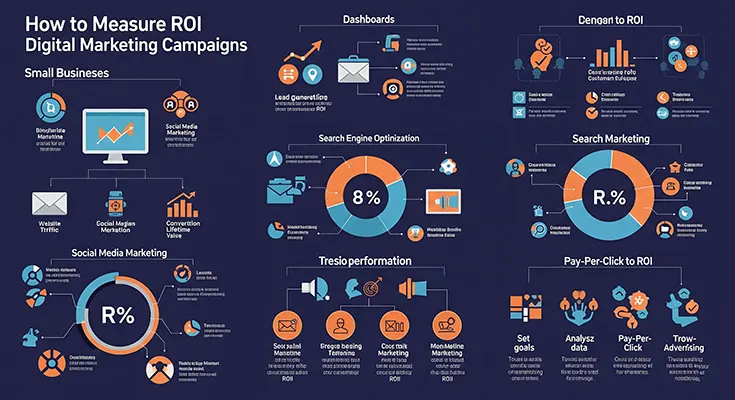In today’s digital landscape, small businesses rely on digital marketing campaigns to reach and engage with their target audience effectively. However, one of the biggest challenges faced by small business owners is determining the Return on Investment (ROI) of their digital marketing efforts. Understanding how to measure the ROI of digital marketing campaigns is crucial for small businesses to optimize their marketing strategies, allocate resources efficiently, and drive sustainable growth. This article provides a comprehensive guide on how small businesses can effectively measure the ROI of their digital marketing campaigns and make data-driven decisions to enhance their marketing performance.
1. Set Clear Objectives and Key Performance Indicators (KPIs)
Before launching a digital marketing campaign, it is essential for small businesses to establish clear objectives and define Key Performance Indicators (KPIs) that align with their business goals. Whether the objective is to increase website traffic, generate leads, boost online sales, or enhance brand awareness, identifying specific KPIs allows small businesses to measure the success of their digital marketing efforts accurately. Examples of KPIs include conversion rates, click-through rates, cost per acquisition, and return on ad spend.
2. Implement Tracking Systems and Analytics Tools
To measure the ROI of digital marketing campaigns effectively, small businesses need to implement robust tracking systems and analytics tools. Utilizing tools such as Google Analytics, Facebook Pixel, and CRM platforms enables businesses to track customer interactions, monitor website performance, and attribute conversions to specific marketing channels. Tracking systems provide valuable data insights that help small businesses understand customer behavior, optimize campaigns in real-time, and evaluate the effectiveness of their marketing activities.
3. Calculate Costs and Revenue Attribution
Measuring the ROI of digital marketing campaigns requires small businesses to calculate both the costs incurred during the campaign and the revenue generated as a result. By tracking the costs associated with advertising spend, content creation, campaign management, and other marketing initiatives, businesses can determine the total investment in a campaign. On the revenue side, attributing sales, leads, or conversions back to specific marketing channels or campaigns allows businesses to calculate the return generated by their digital marketing efforts accurately.
4. Analyze and Compare Performance Metrics
Analyzing performance metrics is essential for evaluating the effectiveness of digital marketing campaigns and determining their impact on the bottom line. Small businesses can examine metrics such as conversion rates, customer lifetime value, customer acquisition cost, and return on investment to assess the success of their campaigns. By comparing performance metrics across different campaigns or channels, businesses can identify trends, strengths, and areas for improvement, enabling them to optimize their marketing strategies for greater ROI.
5. A/B Testing and Optimization
Small businesses can enhance the ROI of their digital marketing campaigns through A/B testing and continuous optimization. By testing different ad creatives, landing pages, messaging, and targeting strategies, businesses can identify the most effective approaches for achieving their marketing goals. A/B testing allows businesses to make data-driven decisions, refine their campaigns based on performance insights, and allocate resources to strategies that deliver the highest ROI. Continuous optimization is key to maximizing the effectiveness of digital marketing efforts and driving sustainable growth for small businesses.
Measuring the ROI of digital marketing campaigns is essential for small businesses to make informed decisions, optimize their marketing strategies, and achieve sustainable growth in a competitive market. By setting clear objectives, implementing tracking systems, calculating costs and revenue attribution, analyzing performance metrics, and conducting A/B testing and optimization, small businesses can accurately measure the ROI of their digital marketing efforts and make data-driven decisions to drive success. With a strategic approach to measuring ROI, small businesses can maximize the impact of their digital marketing campaigns, boost their bottom line, and achieve long-term success in the digital landscape.





